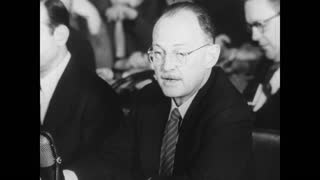This episode of Biography dates to 1962, and aims to provide an overview of Senator Joseph McCarthy’s life, his methods, the political environment of his time, and the consequences of his actions, capturing the essence of one of the most polarizing figures in American political history. It covers McCarthy’s political career, focusing on the period known as McCarthyism in the early 1950s. This was a time when he made unsubstantiated claims about Communist infiltration in the U.S. government and other institutions. It details McCarthy’s rise to national prominence after his 1950 speech where he claimed to have a list of Communists in the State Department. His aggressive anti-Communist campaign made him a highly controversial figure, both praised and vilified. It also recounts McCarthy’s eventual censure by the Senate in 1954, which marked the beginning of his decline in political influence.
00:00: The speaker mentions they are going through an unusual procedure on the Senate floor.
0:17 – 0:20: The procedure is described as a result of the fifth investigation into McCarthy.
0:21 – 0:37: McCarthy speaks about ongoing and future investigations into alleged traitors, suggesting there will be a seventh and eighth investigation.
0:37 – 0:56: McCarthy vows to continue exposing those he believes are destroying the country, regardless of any censure.
0:56 – 1:05: He promises to keep fighting against those who he accuses of destroying the nation, to applause from the audience.
1:11 – 1:15: The speaker identifies the speaker as Senator Joseph McCarthy and introduces his biography.
2:01 – 2:05: Mike Wallace introduces the biography segment on McCarthy.
2:05 – 2:32: Wallace discusses McCarthy’s controversial legacy, questioning whether he was a demagogue or a patriot.
2:32 – 3:05: McCarthy is shown expressing frustration with the committee’s approach to national security, emphasizing the need to identify and remove Communist influences.
3:05 – 3:24: McCarthy’s brief but impactful political career is highlighted, noting his national spotlight lasted only four years but was significant.
3:24 – 4:21: McCarthy’s early life and education are described, including his rise from a grocery store manager to a lawyer and then a judge.
4:21 – 5:23: His military service during WWII and initial political career in Wisconsin are outlined, leading up to his election to the U.S. Senate.
5:23 – 6:04: McCarthy’s rise to fame with his 1950 speech accusing the State Department of harboring Communists.
6:04 – 8:22: The investigation into his accusations, particularly the case of Owen Lattimore, where McCarthy’s claims are scrutinized and largely discredited.
8:22 – 10:36: McCarthy’s broader impact on American politics, his accusations against high-ranking officials, and the backlash from President Truman and others.
10:36 – 12:00: The narrative shifts to McCarthy’s influence within the Republican Party and his re-election in 1952.
12:00 – 13:13: McCarthy gains more power with the chairmanship of the Senate Committee on Government Operations, leading to widespread loyalty investigations.
13:13 – 14:27: His personal life, including his marriage, is briefly mentioned before focusing on his clash with the Army over alleged spying.
14:27 – 18:29: The Army-McCarthy hearings are detailed, showcasing the public and televised nature of the conflict, including McCarthy’s confrontations with other Senators and Army personnel.
18:29 – 20:49: The dramatic confrontation between McCarthy and Joseph Welch, highlighting McCarthy’s alleged cruelty and lack of decency.
20:49 – 22:34: McCarthy’s censure by the Senate, his defiance, and the beginning of his political decline.
22:34 – 24:15: After the censure, McCarthy’s health declines, leading to his death in 1957 from hepatitis.
24:15 – 25:14: A reflection on McCarthy’s career, his impact, and his personal prayer for strength, ending with Mike Wallace’s sign-off.
Motion picture films don’t last forever; many have already been lost or destroyed. For almost two decades, we’ve worked to collect, scan and preserve the world as it was captured on 35mm, 16mm and 8mm movies — including home movies, industrial films, and other non-fiction. If you have endangered films you’d like to have scanned, or wish to donate celluloid to Periscope Film so that we can share them with the world, we’d love to hear from you. Contact us via the weblink below.
This film is part of the Periscope Film LLC archive, one of the largest historic military, transportation, and aviation stock footage collections in the USA. Entirely film backed, this material is available for licensing in 24p HD, 2k and 4k. For more information visit http://www.PeriscopeFilm.com


